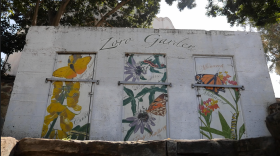For the past two weeks, as schools, businesses and government offices closed down to stem the spread of coronavirus, immigration courts in San Diego have remained open for asylum-seekers in the Trump administration’s “Remain-in-Mexico” program.
They were being bused up daily from Tijuana for court hearings in the U.S., before being returned to Mexico. Public health experts worried that this process was helping spread COVID-19, the disease caused by the coronavirus, to Mexico.
Last Friday, immigration judges postponed the so-called Migrant Protection Protocols (MPP) hearings in protest of the federal government’s refusal to close the courts.
RELATED: Immigration Courts Remain Open In Face Of Global Pandemic
On Monday, the federal government finally relented.
The U.S. Department of Justice issued a statement saying all M.P.P. hearings have been postponed to at least April 22, due to COVID-19. It went on to say asylum-seekers with court dates during this time should come to the port of entry to receive new court dates.
But immigrant advocates believe this leaves an already vulnerable group at risk during a public health emergency.
“We know that in Tijuana and in Mexican border cities generally, people are stuck in situations and in communities where they have a very serious lack of access to really essential resources, said Monika Langarica, an attorney with the ACLU of San Diego and Imperial Counties. “We know folks are forced to live in these highly concentrated and dense shelters. Their risk of contagion is heightened.”
Langarica and other advocates have called on the Trump administration to accept people in the M.P.P. program into the US while their asylum cases wind through the courts, which was the practice before last year. This would mean asylum-seekers can be near family and other resources during this global health crisis.







